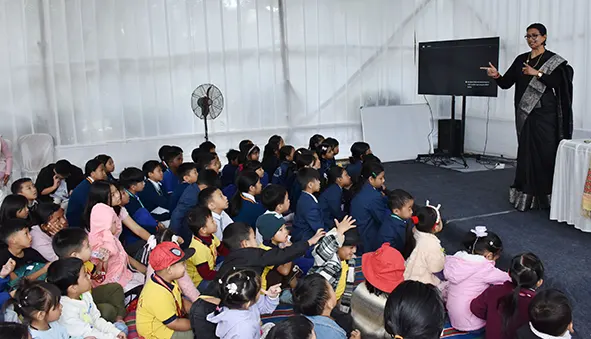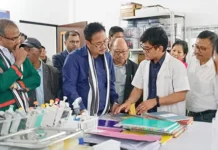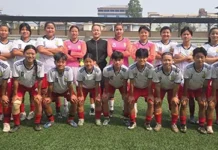ITANAGAR, 22 Nov: The Arunachal Literary Festival (ALF) 2025 wrapped up its three-day event on Saturday, celebrating the power of narratives across food, culture, and technology, while finding its heart in the Children’s Corner, which was unanimously dubbed the ‘most happening section’ of the whole fest.
The final day at the Namdapha Hall began with an eye-opening session on ‘Gastronomy: Books and bites’. Panellist Sona Bahadur, discussing her new book Invitation to Feast, emphasised that India’s rich culinary heritage is at risk due to poor documentation. The conversation explored the sociological and political dimensions of food, including the unfortunate “otherization” of Northeast India’s unique cuisines. The panel powerfully reminded attendees that the kitchen, viewed through a literary lens, is a space brimming with stories of memory and resilience.
The Children’s Corner engaged young minds from the start: renowned artist Deepa Kiran, founder of Story Arts Foundation, enchanted children with a unique musical storytelling performance, and acclaimed author Pankaj Saikia led an imaginative workshop on wordless stories, encouraging kids to embrace the visual medium.
The intellectual core of the festival lay in the discussions at Pakke Hall. The session on ‘Narrating the native’, moderated by Bompi Riba, brought together voices like Miranda Pertin, who called for documentation of the rapidly changing ‘native’ identity, and picture-book maker Ogin Nayam, who stressed the primacy of the visual feed in connecting with young readers.
Attendees were also treated to a special poetry reading session of 14 poets, both experienced and emerging talents, led by Padma Shri recipient Sheen Kaaf Nizam, a highly revered contemporary Indian Urdu poet and scholar.
The deeply human final session at the Pakke Hall on ‘What makes world literature?’, moderated by Tashi Chophel, began with a personal question: Which book would they claim as their own? The discussion affirmed that “reading will never die,” with panellists reflecting on books tied to personal history and trauma like Aanchal Malhotra’s focus on the Partition and celebrating the enduring spirit of bookshop culture.
The festival offered a final, grounded take on technology in the debate on ‘Literature in the age of AI’, concluding that while artificial intelligence poses challenges, it can never replicate the fundamental human elements like emotions and feelings that define great literature.
The ALF 2025 successfully illuminated the human experience, demonstrating that literature is not just about words, but about identity, connection, and the stories people share around the world and at the dinner table.
The festival also highlighted international educational opportunities, featuring Maria Gill Burman, director at the Institute of Cervantes, in Namdhapa Hall. Burman presented a lecture on the institute’s role in promoting Spanish language and Hispanic culture, and encouraged the participants to enrol in their programmes and embrace global exchange.
The festival drew to a poignant and powerful close with a deeply engaging session at Namdhapa Hall. The final event, ‘In conversation with Aanchal Malhotra’, provided a powerful culmination of the festival’s themes. The renowned oral historian and author, known for her seminal work on the Partition, offered attendees a profound exploration of memory, material culture, and the enduring human narratives of history.
The concluding session was a testament to the festival’s commitment to fostering meaningful dialogue and offering diverse perspectives, ensuring that the 2025 edition ended on a positive note of intellectual depth and emotional resonance. (DIPR)



